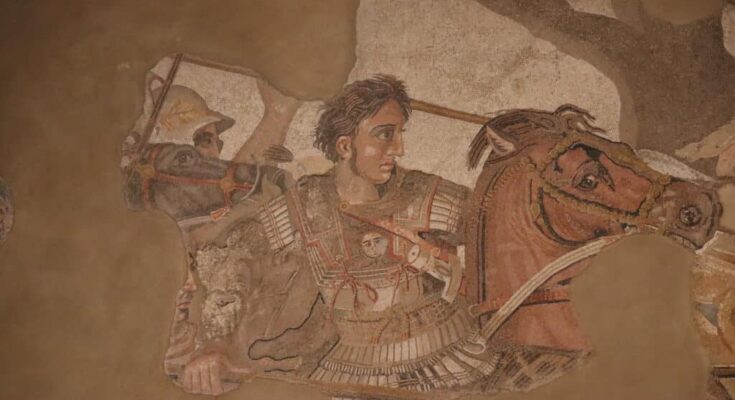
Alexander the Great was a remarkable figure in Greek history for many reasons. However, one remarkable fact unknown to many is that Alexander the Great was allegedly descended from ancient Greek mythology’s Heracles.
Since Alexander the Great’s dynasty is well documented, how was Heracles supposed to have been ancestrally related to him?
How the Greek kings were descended from Heracles
The resolution to this mystery is simply that Heracles was allegedly the ancestor of Alexander the Great’s dynasty, the dynasty that ruled over Macedon. How did this supposedly happen?
A famous event in Greek legend is the Return of the Heracleidae. Ancient Greek writers associated this event with the Dorian invasion. The Heracleidae are the descendants of Heracles. Upon their legendary return, they and their associated Dorians became dominant over much of Greece.
One of Heracles’ descendants was Temenus. He was Heracles‘ great-great-grandson. Temenus took over Argos and the surrounding region and established a dynasty there. Hence, the kings of Argos were allegedly the descendants of the mythological Heracles.
Heracles as the ancestor of the kings of Macedon
At some point after this, descendants of Temenus went off to found the dynasty of Macedon. There are conflicting records over when exactly this happened. According to the most traditional version, the founder of Macedon was a figure named Caranus, the son of Temenus.
Several generations after Caranus, one of the kings of Macedon was Perdiccas I. He was a historical king of the seventh century BC, as historical records confirm. However, the earliest records contradict this idea. According to Herodotus, Perdiccas I himself was the son of Temenus.
Today, most scholars agree that later Greek writers invented Caranus for political reasons. In reality, the tradition preserved by Herodotus is the oldest and therefore most reliable account.
The descent from Heracles to Alexander the Great
When we look at the earliest evidence, what can we say regarding the legendary descent of Alexander the Great from Heracles? As we have just seen, Temenus was the great-great-grandson of Heracles, meaning that Perdiccas I was Heracles’ great-great-great-grandson.
Perdiccas I, for his part, was the founder of Macedon and lived in the seventh century BC. His son and successor was Argaeus I. Historians do not know much about the early kings of Macedon due to the limited historical sources for that era. Nonetheless, we know that Argaeus’ son was Philip I.
This name, of course, is the same as that of Alexander the Great‘s father. The fourth successor after Philip I was King Alexander I. He, in turn, was succeeded by Perdiccas II. Several generations later came King Alexander II, who was coincidentally succeeded by another Perdiccas.
Finally, in the year following the reign of Perdiccas III, Philip II of Macedon began his rule. He was the father of Alexander the Great. Thus, Alexander the Great was the descendant of Heracles through a long line of kings going back through Perdiccas I, founder of Macedon and son of Temenus, great-great-grandson of Heracles.



